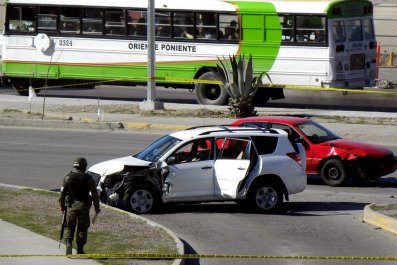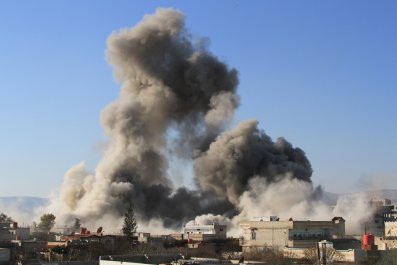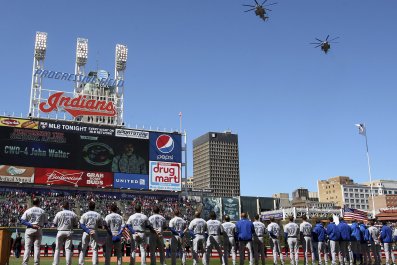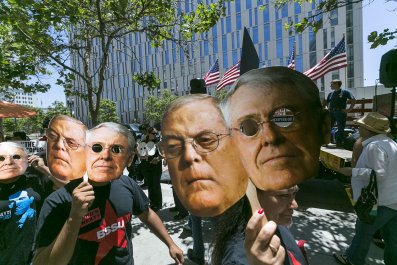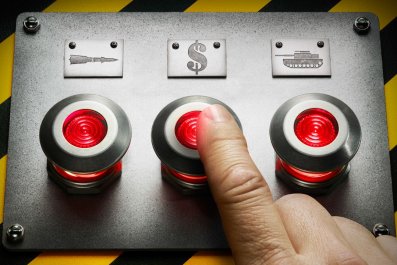The fight for America's soul is upon us, and the arid lands of Bunkerville, Nev., are the key battleground. On a ranch near Nevada's southern tip, an American hero is standing up to an oppressive federal government. And freedom is winning.
That, at least, is how many libertarians, extreme conservatives and anti-government campaigners view it.
Here are the facts: Cliven Bundy, a 60-something Nevada rancher, allowed his cattle to graze on federally owned land for 20 years in violation of the law. After a protracted court battle, the U.S. Bureau of Land Management (BLM) slapped the rancher with $1 million in accumulated fines. Bundy has no intention of paying.
Why? "I believe this is a sovereign state of Nevada," Bundy said. "And I abide by all Nevada state laws. But I don't recognize the United States government as even existing."
The BLM, like a bank with a delinquent mortgage, seized Bundy's cows. In the process, it arrested one of his 13 children and assaulted another. The incident was captured on video, which went viral on the Internet. And that's how a local dispute over a few heads of cattle flared into a national rallying point for anti-government groups—with conservative media and even a few Republican politicians helping to fan the flames.
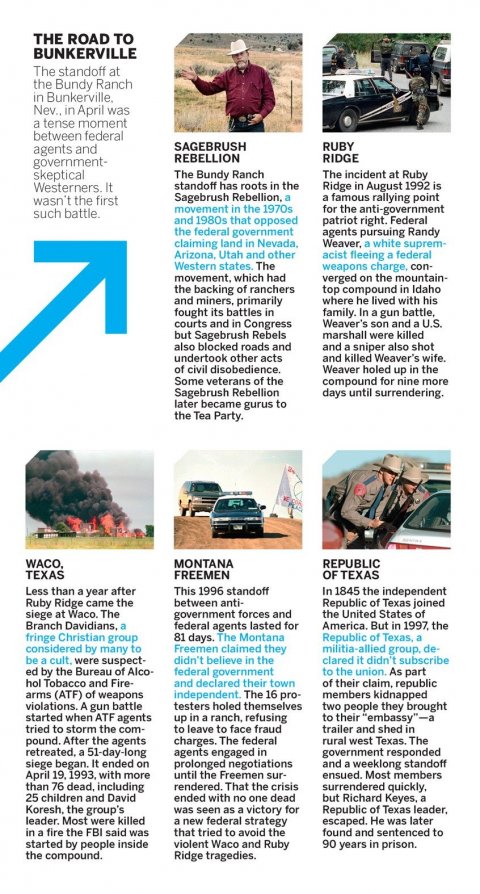
On the weekend of April 12 to 13, over 1,000 anti-government militia groups and Bundy supporters converged on his ranch to defend him from the encroachment of federal agents and demand the return of his cattle. Around 10 a.m. Saturday, Bundy issued an ultimatum to the Clark County sheriff: He had one hour to disarm all federal agents on the property, return the cattle and remove the BLM from Bundy's land.
At 11:10 a.m., Bundy got on a megaphone and told his supporters to go get his cattle back. Local ranchers on horseback, militiamen in pickup trucks and others rode toward the corral where the cattle were being held. BLM agents, decked out in full riot gear, pointed guns at the anti-government group. The two sides jostled.
With the situation nearing the boiling point, the BLM blinked.
"For the anti-government patriot right, this is a major success," said Ryan Lenz, an eyewitness to the standoff on the Bundy ranch and a writer and researcher with the Southern Poverty Law Center. "They stood against an armed, fanatical federal government and got them to back down—in their view."
Why did the federal agents retreat in the face of an angry, armed mob that appeared to be clearly breaking the law? A BLM official said, "We have made a decision to conclude the cattle gather because of our serious concern about the safety of employees and members of the public."
But a further explanation lies in recent history.
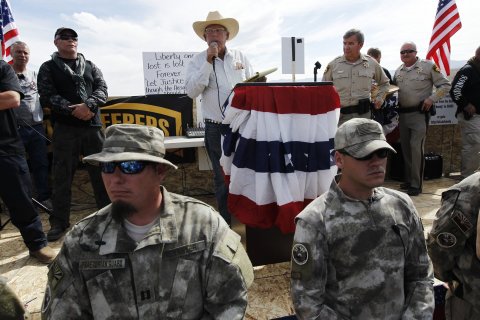
In 1992 a standoff at a cabin on a northern Idaho mountaintop called Ruby Ridge between white supremacist Randy Weaver and his family turned deadly when FBI snipers shot dead Weaver's son and his wife. For the next nine days, federal agents laid siege to the compound.
A year later, the FBI besieged a compound in Waco, Texas, belonging to the Branch Davidians, a religious sect accused of holding illegal firearms. By the time the siege was over, 76 people, including women and children, had burned to death in a conflagration that may have been started by the cult's leader, David Koresh, or perhaps by the federal agents.
In 1995, Timothy McVeigh, a militia movement member motivated by the killings at Ruby Ridge and Waco, bombed a federal building in Oklahoma City, killing 168 in the second deadliest act of terrorism in American history after the Al-Qaeda attacks of September 11, 2001. After McVeigh was found guilty of murder and executed, the anti-government patriot right largely retreated due to government crackdowns and changing perceptions.
Many believe that BLM agents did not want at Bunkerville a repeat of the tragic scenes at Waco and Ruby Ridge. Ruby Ridge and Waco helped catalyze the anti-government patriot movement, which is now mobilizing in support of Bundy. Many came to the protest with loaded firearms.
Among Bundy's supporters are the Oath Keepers, law enforcement and military officers who say they will disobey orders they think violate the Constitution. State militia groups have joined the protest as well. The paramilitary Southern Nevada Militia declared on its website, "This is what we have trained for, for almost two years."
The anti-government movement is nothing new. "This is a continuing, recurring phenomenon in the American political landscape, one that ties into both a hatred of American government as it's conceived by them as well as a deep-seated gun culture," said Devin Burghart, vice president of the Institute for Research and Education on Human Rights, who has studied extremist groups in America for years.
The ideologies of the militia movements are eclectic. Conspiracy theories about a "New World Order" and the United Nations as the instrument of world government feature heavily. Some advocate not just expanded states' rights but sovereignty for counties, too. The Bundy ranch standoff suggests that the militiamen never went away.
But something is different this time. It's not only fringe militiamen lending support to Bundy. Some Republican politicians and many in the conservative media have also made Bunkerville into a cause célèbre. Several local Republicans traveled to the Bundy ranch to show their support for the militiamen and anti-government patriots.
David Livingston, a Republican member of Arizona's Legislature, was one of them. "I've heard that this is about a guy who's not paying taxes," Livingston told Newsweek. "That's not the issue. The issue is property rights and the federal government overreaching."
He added, "[The standoff] was about freedom. It was about property rights, Second Amendment rights, free speech rights. All those issues. Not everyone sees everything the same way, but it wasn't about grazing costs." Four other Arizona legislators stood with Bundy.
Republicans on the national stage are also lending support. Ron Paul, a libertarian-leaning former Republican congressman from Texas, compared the situation to Waco and voiced his admiration for the Bundy ranch crowd.
Paul said on his website the standoff shows that "when the American people speak out, their voices can be heard and can affect what government is doing." But he also warned his followers, "As much as I'd like to see this as a victory for the people, I'm afraid the government has more guns, more power and more determination to express their authoritarianism."
Tea Party groups have not yet gone as far as publicly backing the militia movement, but, said Burghart, "there is a big and growing crossover between militia groups and tea party groups, particularly at the local level."
Conservative media have also helped fan the flames. Fox News's Sean Hannity has invited Bundy onto his show twice. Conservative news site The Drudge Report has touted a theory, put forward by some, that the truth behind the Bundy ranch affair is that Nevada's Harry Reid, the Democratic Senate majority leader, wants to claim the land for a solar energy deal with a Chinese company, a theory that hasn't stood up.
A violent showdown was averted at the Bundy ranch that weekend, but the issue of Bundy's cattle and the federal land is likely to drag on. "The door isn't closed," a BLM official said. "We'll figure out how to move forward with this."
But the Bundy family and its supporters aren't likely to give up easily, either. "The people have the power when they unite," Ammon Bundy, Cliven's son, told a Las Vegas newspaper after the standoff. "The war has just begun."
Corrections: An earlier version of this story incorrectly named the group of law enforcement and military members who swore an oath to uphold the constitution, they are the Oath Keepers. Also, Ron Paul is a former congressmen.




